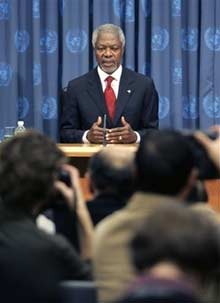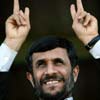'Iran intervention would be unwise'
Updated: 2006-12-20 09:14
United Nations - UN Secretary-General Kofi Annan said Tuesday a negotiated settlement with Iran over its nuclear program should be sought, and he warned that military intervention would be "unwise and disastrous."
He addressed concerns about a possible military operation in Iran at a farewell news conference in response to a question about how the Security Council should deal with crises after the Iraq war. The council refused to authorize a war against Saddam Hussein in 2003 and Annan called the UN's failure to stop the conflict "the worst moment" of his 10 years as secretary-general.
"You mentioned Iran, which implies that there is concern that there may be another military operation there," Annan told a reporter. "First of all, I don't think we are there yet, or we should go in that direction."
"I think it would be rather unwise and disastrous," he said.
"I believe that the council, which is discussing the issue, will proceed cautiously and try and do whatever it can to get a negotiated settlement for the sake of the region and for the sake of the world," he said.
The Bush administration has repeatedly declined to rule out the use of force in Iran, although senior officials have also said their first choice is to rely on diplomacy.
A senior US defense official said the idea of building up US Navy forces has been discussed for some time and one proposal is to send a second aircraft carrier to the region. The official, speaking on condition of anonymity because the idea has not been approved, said it's unclear when a decision will be made.
Iran insists its nuclear program is aimed solely at the peaceful production of nuclear energy, but the Americans and Europeans suspect Tehran's ultimate goal is the production of nuclear weapons
Iranian President Mahmoud Ahmadinejad reiterated Tuesday that possible Security Council sanctions would not stop Iran from pursuing uranium enrichment, a technology that can be used to produce nuclear fuel for civilian purposes or fuel for a nuclear bomb.
| ||||||
"What I'm worried about is we may see competitive development of these devices," Annan said. "And we need to take time -- we need to take real effort to assure that we don't get into that situation in the region."
The latest draft resolution being discussed by key Security Council members would order all countries to ban the supply of specified materials and technology that could contribute to Iran's nuclear and missile programs. It would also impose a travel ban and asset freeze on key companies and individuals in the country's nuclear and missile programs who are named on a UN list.
Russia and China remain at odds with the United States and key European countries over the travel ban and a list of companies and individuals that should be subject to a freeze of their financial assets.
Russian Ambassador Vitaly Churkin said Monday there had been "some progress" during talks among the six key nations trying to negotiate with Iran -- Britain, France, Germany, the US, Russia and China. But he called the travel ban "unnecessary" and said that while Moscow accepts the concept of having some financial restrictions related to prohibited nuclear-related activities, "we have not agreed with the list."
Ambassadors from the six countries met again Tuesday, with the United States and Britain pushing for adoption of the resolution this week, but the same problems remained, with Churkin reiterating his opposition to the travel ban.
Chinese Ambassador Wang Guangya said there were still differences.
"I would say sometimes it looks like a technical difference, sometimes it looks like a political difference," Wang said.
The full 15-member council was scheduled to discuss the proposed resolution later Tuesday.
"We are very close, we think," State Department spokesman Sean McCormack said in Washington. "This should be easy; there should be a 15-0 vote."
Acting US Ambassador Alejandro Wolff said Monday the US views the travel ban as "a priority and an important element of this resolution and we will continue to push for it."
The six countries offered Iran a package of economic incentives and political rewards in June if it agreed to consider a long-term moratorium on enrichment and committed itself to a freeze on uranium enrichment before talks on its nuclear program.
With Iran refusing to comply with an Aug. 31 council deadline to stop
enrichment, Britain and France circulated a draft sanctions resolution in
October.
|
||
|
||
|
|



